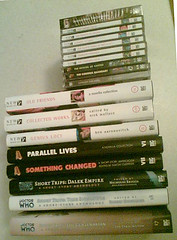 Things you can do with your Doctor Who Money, as made available at the fun-packed official website of official fun-packed Dr Who:
Things you can do with your Doctor Who Money, as made available at the fun-packed official website of official fun-packed Dr Who:Happy Phil Collinson :)

Sad Phil Collinson :(
The blog of writer and producer Simon Guerrier
 Things you can do with your Doctor Who Money, as made available at the fun-packed official website of official fun-packed Dr Who:
Things you can do with your Doctor Who Money, as made available at the fun-packed official website of official fun-packed Dr Who:
Sad Phil Collinson :(
 Eddie Robson's "The Empire State" arrived in the post this morning, ending my first year as King of Bernice Summerfield. Here is a picture of the Big Finish things I worked on last year. Eight books and 10 CDs, and I need to rethink my shelving.
Eddie Robson's "The Empire State" arrived in the post this morning, ending my first year as King of Bernice Summerfield. Here is a picture of the Big Finish things I worked on last year. Eight books and 10 CDs, and I need to rethink my shelving.“There is a story in ancient history, sometimes told of Philip of Macedon, sometimes of the Roman emperor Hadrian. While travelling on a journey he was approached by a woman who demanded he listen to her. The woman was insistent. But the emperor replied that he had no time, he had to be on his way. To which the woman replied, ‘Then do not be king!’ The emperor stopped, turned around, and listened.”
Jeremy Paxman, On Royalty, pp. 219-9.
The book is highly engaging, full of great stories and insights. It’s told very simply, too – a wealth of hard work and research deftly concealed from the reader.“It would take a very bleak view of human nature to argue that this promotion of causes which fall between the paving stones of ordinary life was anything but a good thing.”
Ibid., p. 230.
And the problem for republicans is to show how we’d be better off without them."I laughed and locked the wheel in. ‘Nobody gets beyond a petroleum economy. Not while there’s petroleum there. We don’t burn it, if that’s what you mean. But it’s still essential for the production of plastics, synthetics, food base, and keroids. Two hundred billion people use a lot of plastic.’"
Dan Simmons, Hyperion, p. 444.
It’s nicely in contrast to the usual sci-fi stuff in which humanity eats space up like a cancer. Yet the stuff about oil also makes it feel oddly close to home, and not sufficiently distant to convince of the 29th century. Hope your Christmi were as splendid as ours, brimming with red wine and roast goose.
Hope your Christmi were as splendid as ours, brimming with red wine and roast goose. “‘ People like to read about someone who is deeper in the shit than they are,’ [Bernard] said. In fact the real reason for his popularity was much less cynical and cruel: people like to read about someone who broke all the rules, who drank and smoked far too much, who was rude about feminists, homosexuals and ethnic minorities, who was politically utterly incorrect, who behaved outrageously, and yet who somehow survived and even managed to surround himself with an ever-increasing harem of beautiful women.”
Graham Lord, Just the One – the wives and times of Jeffrey Bernard, pp. 229-230.
I was first made aware of Jeffrey Bernard by reading a newspaper obituary. In the photo, a glut of uncommon celebrities jostled one another at the wake. And in the background, ignoring the camera, Tom Baker propped up the bar.“‘I can’t think of anybody else in journalism who writes only, only about themselves. It’s a considerable achievement, I think, to (a) do nothing at all except drink, and (b) be able to write about it ever single week and still be interesting.’”
Ibid., p. 230.
Most boozers just couldn’t do that. That you got something – a joke or a smile or an article – explains how Jeff persevered. He’d scrounge hand-outs and floorspace off anyone, and sex off girls who could surely do better.“‘a little devil caught out in an act of charity.’”
Ibid., p. 255.
Tom who, flush as the fourth Droo, bought him a couple of suits, says that Jeff at least sang for his supper. Bernard, not the drinking, was witty and exciting. He was an exception to the borish, dull alkie – a bit apart from the other self-destructing regulars. His writing can be keenly observant and hilarious, and even Jeff is often bored by his lifestyle. He is less a role model as a warning.Escape is a fixture in escapist fiction. Our heroes look sly and resourcedul when they can break out of cells, baddie bases and countries using only bits of tin can and their shoelaces.
In fact, it’s a bit of a cliché. One not uncommon criticism of my own “The Time Travellers” is that the austere detention centre on Byng Street is daringly escaped-from twice. (I argue (not entirely winningly) that this is in keeping with the spirit of Old Show.)
I guess escapology’s appeal comes from real escapes, most famously those during wars. Until recently, I’d always associated them with the second world war – and even the Imperial War Museum’s escape show last year focused on Steve McQueen’s moped and Colditz.
But Winston Churchill’s first dalliance as national hero was in 1899, when he escaped from a POW camp in Pretoria.
More recently, Neil Gaiman admitted that he and magician Penn Jillette are working on a film version of a real First World War escape. Hilary Bevan Jones – whose Endor Productions won awards for the fab “State of Play” – spoke of it, too, a few years ago:
“My big ambition is to make the film of my grandfather's book, ‘The Road to Endor’. It's a true story of how he escaped from a Turkish prison camp during the First World War. David Lean had it optioned for years, but it's back in the family again. I only just feel grown-up enough to make it now!”
Liz Hoggard, “All my own work”, The Guardian, 21 March 2004
On Gaiman’s recommendation, I sought out the book via Abe.
Lieutenant EH Jones tells of a plucky confidence trick, played out over more than a year. As much from boredom as anything, the imprisoned Jones fakes a Ouija board session, and pretends he’s in touch with the spirits.
But rather than making his comrades laugh, they start to take him in deadly earnest. Jones, you see, can remember the board even blindfolded…
"The growth of a belief is difficult to describe, for growth is not a matter of adding one piece here and another there. It is not an addition at all, it is a process; and the most that can be done in describing it is to state a few of the outstanding events and say, ‘this marks one stage in the process, that another.’ … In any investigation each point as it is reached is subjected to proof. Once passed as proved it forms in its turn part of the foundation for a further advance in belief. It is the part of the investigator to make certain he does not admit as correct a single false deduction. If he does the whole of his subsequent reasoning is liable to be affected.
It is particularly easy, in a question like spiritualism, to allow fallacy to creep in. There is a basis of curious phenomena which certainly exist and are recognised by scientists as indubitable facts. But the investigator must be careful, in every instance, to assure himself that he is in the presence of the genuine phenomenon, and not of an imitation of it, and, as a matter of fact, this is sometimes impossible to do."
EH Jones, "The Road to En-Dor", p. 23.
Soon the Turkish warders have been snared in the scam, Jones and partner Lieutenant Hill winning small allowances for the other POWs. The camp itself is the former home of now-missing Armenians – the book speaks of the massacre quite openly. So Jones uses the promise of hidden Armenian treasure, and the threat of the spirits’ revenge, to attempt a brilliant escape.
Eric Williams (who wrote the best-selling “The Wooden Horse”) introduces the whole thing as, “for sheer ingenuity, persistence and skill … second to none among such books”.
It’s certainly a funny book, lively book full of vivid characters and set-ups. I was also surprised in the footnotes by how many of those comrades mentioned tried their own escapes – and went on to write their own books about them.
The mechanics of the trick and the ways they fool doubters are explained in some detail, and I can see the appeal to a mage like Jillette. The plan does not all go swimmingly either, and several times nearly kills the two tricksters. As a result, it becomes less about the scam but the steely determination with which the two blokes see it through.
That said, the telling is often disjointed narrative, jumping back and forth between years and incidents, so sometimes not easy to follow. There’s a hell of a lot of place names and people to remember, and the tangents and asides could have been more effectively edited.
Part conman’s handbook, part military history, part pot-boiling shocker, it’s a compelling – if not always easy – read. And cor, there’s a brilliant movie in there. So do get a shift on with that, Neil.
“I cut myself off from reading anything about Shakespeare, went on what I knew already, and then checked afterwards. … I didn’t want to read James Shapiro’s book 1599 … in case I got bogged down.”
Gareth Roberts, interviewed by Rex Duis, “Script Doctors”, Dr Who Magazine 377 (3 January 2007), p. 13.
Well, it’s still a rich and lively book, whatever Gareth says. It avoids the usual failing of literary biography (as I’ve discussed with Wodehouse) – not so comprehensively linking the elements in his stories to influences surrounding him that it’s like Will was less creator than copyist. But Shapiro is also keen to show that Shakespeare’s work is not timeless, and that far all he was a transcendent genius, he was very much of his age."There is so much in the [Narnia] books that I love, but each time I found the disposal of Susan to be intensely problematic and deeply irritating. I suppose I wanted to write a story that would be equally as problematic … if from a different direction."
Neil Gaiman, Introduction to Fragile Things, p. xxii.
With reference to other strange children’s fictions like Mary Poppins and Dahl’s Mathilda, it manages to be something more altogether about the faults and something extra with which we fill up our kids."Look... I really want to help put the matter straight and I'll answer any questions you have. But had you ever considered how you might one day fancying being Lord Knacker?Anyway, we did add on a whole thirteen minutes, which I don't think qualifies us for any compensation under rules for the victims of crime. Were it to turn out that anything untoward had gone on, which of course is completely unlikely.
Come on, I've a flight booked to Finland..."
“If there is no Power of Nightmares in your package, it means that something went horribly wrong and the retailer was asked to remove the film.”Which implies some terrible censorship, whether voluntary (on the part of suppliers or distributors) or enforced by the Powers That Are. However, Curtis’s own comments from last year offer another explanation:
“The films are full of archive film and music from a multitude of sources. The reason my series are normally not released on DVD is that it is prohibitively costly and a nightmare - no pun intended - to clear the rights.”
Adam Curtis, “Power of Nightmares re-awakened”,
BBC News, 26 April 2005.

